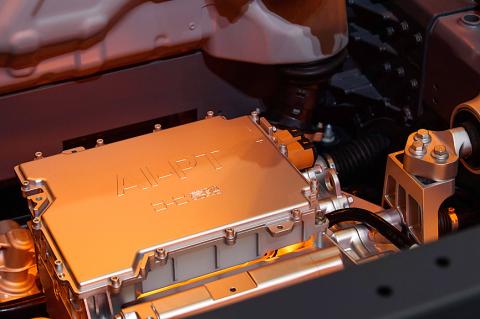A US$28,000 SUV looks set to become the first Chinese entrant in Europe’s electric-vehicle market, betting that its competitive price would help draw customers away from the likes of Volkswagen AG and Tesla Inc.
Shanghai-based automaker Aiways (愛馳汽車) has secured permits and certifications for a European launch and plans to start sales in the second quarter of next year, cofounder Fu Qiang (付強) said in an interview.
The firm is to start selling the vehicle, called U5, in China this month.

Photo: AFP
While the European variant is to be adapted to local tastes and regulatory requirements, Aiways could have a tough time winning over buyers in a market dominated by local, US and Japanese brands for decades. The debut will be watched closely by dozens of other Chinese electric-vehicle makers with global ambitions.
“I believe we will be the first,” Fu said in Shanghai.
Others “are still in the preparation period” or even further away with their plans, he said.
A successful domestic launch by the less-than-three-year-old company would defy rapidly souring demand trends in the broader Chinese electric-vehicle market. The industry’s sales have fallen for three straight months through September as the government — after spending billions of yuan to nurture the industry — scaled back subsidies this year.
Penetrating the European market would mark a historic shift in its own right. European brands’ sales in China have for many years underpinned much of the continent’s manufacturing strength, and countries like Germany are ramping up efforts to support their own expensive shift toward electric vehicles as global competition picks up.
Convincing European customers that a Chinese vehicle can meet their expectations is one of Fu’s main challenges.
Failures by other Chinese companies have left consumers with a poor image of the country’s products, he said.
At the same time, he is hopeful that more recent successes by Chinese consumer-goods and smartphone producers might have built up trust.
The U5’s launch in China is scheduled for Nov. 29 and is to involve a mix of marketing strategies, including showrooms in larger cities and online sales. The domestic price will be 200,000 yuan to 300,000 yuan (US$29,000 to US$43,000).
In Europe, the company would try to reach consumers through pop-up stores, leasing offers and local partners, with Norway, the Netherlands and Germany among the key targets, Fu said.
The planned starting price for the most basic version is about 25,000 euros (US$28,000), which could give Aiways an edge.
While small electric vehicles from Volkswagen and its competitors start from less than 30,000 euros, electric SUVs easily go for twice that or more. Tesla’s Model X SUV can cost more than 100,000 euros in Europe.
If Aiways is successful, it would in part be because of its use of German know-how. Since the beginning, Fu has worked closely with his German business partner, Roland Gumpert, a former Audi engineer and automaking veteran. Their joint venture, Gumpert Aiways, now acts as the Chinese company’s Ingolstadt, Germany-based research-and-development center.
“Even though most of our engineers are Chinese, we say we are a company based on German technology,” Fu said.

The Eurovision Song Contest has seen a surge in punter interest at the bookmakers, becoming a major betting event, experts said ahead of last night’s giant glamfest in Basel. “Eurovision has quietly become one of the biggest betting events of the year,” said Tomi Huttunen, senior manager of the Online Computer Finland (OCS) betting and casino platform. Betting sites have long been used to gauge which way voters might be leaning ahead of the world’s biggest televised live music event. However, bookmakers highlight a huge increase in engagement in recent years — and this year in particular. “We’ve already passed 2023’s total activity and

Nvidia Corp CEO Jensen Huang (黃仁勳) today announced that his company has selected "Beitou Shilin" in Taipei for its new Taiwan office, called Nvidia Constellation, putting an end to months of speculation. Industry sources have said that the tech giant has been eyeing the Beitou Shilin Science Park as the site of its new overseas headquarters, and speculated that the new headquarters would be built on two plots of land designated as "T17" and "T18," which span 3.89 hectares in the park. "I think it's time for us to reveal one of the largest products we've ever built," Huang said near the

China yesterday announced anti-dumping duties as high as 74.9 percent on imports of polyoxymethylene (POM) copolymers, a type of engineering plastic, from Taiwan, the US, the EU and Japan. The Chinese Ministry of Commerce’s findings conclude a probe launched in May last year, shortly after the US sharply increased tariffs on Chinese electric vehicles, computer chips and other imports. POM copolymers can partially replace metals such as copper and zinc, and have various applications, including in auto parts, electronics and medical equipment, the Chinese ministry has said. In January, it said initial investigations had determined that dumping was taking place, and implemented preliminary

Intel Corp yesterday reinforced its determination to strengthen its partnerships with Taiwan’s ecosystem partners including original-electronic-manufacturing (OEM) companies such as Hon Hai Precision Industry Co (鴻海精密) and chipmaker United Microelectronics Corp (UMC, 聯電). “Tonight marks a new beginning. We renew our new partnership with Taiwan ecosystem,” Intel new chief executive officer Tan Lip-bu (陳立武) said at a dinner with representatives from the company’s local partners, celebrating the 40th anniversary of the US chip giant’s presence in Taiwan. Tan took the reins at Intel six weeks ago aiming to reform the chipmaker and revive its past glory. This is the first time Tan